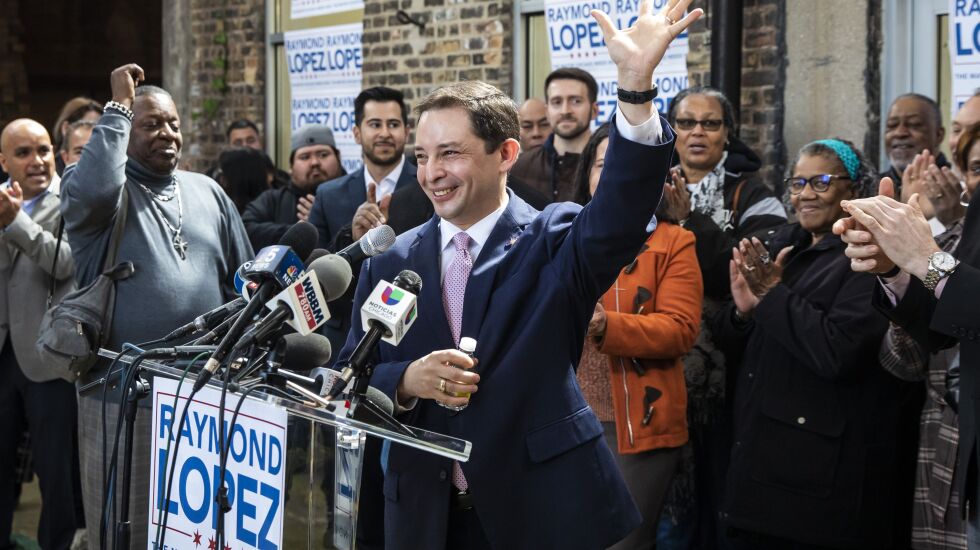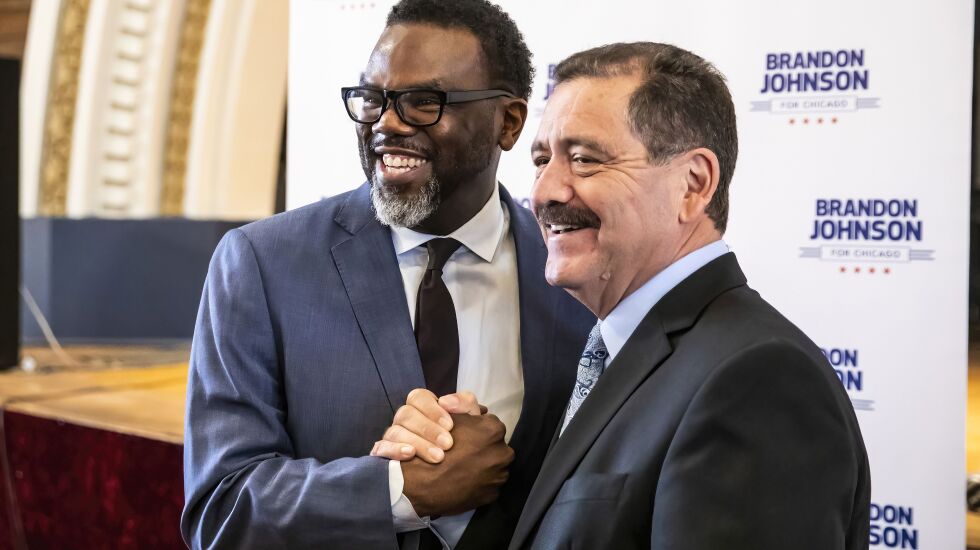Ald. Ray Lopez (15th), one of the police union’s staunchest City Council supporters, on Tuesday declared his candidacy for Congress against progressive leader U.S. Rep. Jesus “Chuy” Garcia.
That sets the stage for a showdown in the March primary election between opposite sides of the political spectrum within the Democratic Party.
Like Garcia, Lopez ran for mayor. Unlike Garcia, he dropped out and backed the wrong horse by endorsing Paul Vallas. Garcia finished fourth behind Brandon Johnson, Vallas and incumbent Mayor Lori Lightfoot.
Vallas lost the mayoral runoff to Johnson after Garcia endorsed Johnson, reuniting Chicago’s fractured family of progressives.
Without Johnson’s support, Lopez faces an uphill battle in one of two Illinois districts drawn to elect a Hispanic to Congress. The district includes parts of 13 Chicago wards as well as portions of 30 suburbs. They include flood-ravaged Cicero and Berwyn as well as Stickney, Lyons, Summit, Melrose Park, Franklin Park and parts of Oakbrook, LaGrange, Riverside and Brookfield.
Also challenging for Lopez will be the alderman’s anemic fundraising and the fact that Garcia will run with support from the Democratic Congressional Campaign Committee, which has a policy of supporting incumbents.
That could help Garcia, who has his own history of lackluster fundraising. So could return-the-favor endorsements from Johnson and his political patrons, the Chicago Teachers Union and the Service Employees International Union and its affiliates.

Against that backdrop, Lopez, 45, was asked why he believes he stands a chance against the 67-year-old Garcia.
He responded that Johnson’s influence “stops at the city’s border” and that the race “needs a moderate leader to match the moderate views” of 4th Congressional District voters.
“After walking the district for the past few weeks, I’ve heard directly from residents who feel as though they don’t have a voice in their current representative. They feel that the politics has gotten too extreme. That Democrats have been left out in the cold or marginalized because they’re not taking some of the more extreme positions that we’ve seen come out of the Socialist and super-progressive movements over the last few years,” Lopez said.
“This district … encompasses the Southwest Side of Chicago, but many of the Southwest suburbs all the way into DuPage who still believe in law enforcement. Who believe in accountability and personal responsibility. Who believe in working toward the middle to find solutions for real problems and they haven’t seen that from their congressman.”
Lopez acknowledged that raising money for a Congressional race, where contributions are capped, will be difficult and that those challenges will be compounded by the “advantages afforded to incumbents.”
But, he argued that he is a “better fundraiser on the small-dollar level” than Garcia.
“He’s gonna rely on mega-PAC’s to try and save him. He relies on multi-million-dollar checks to be written to cover him. But, this isn’t about him. This is about the district. And no amount of money is going to protect him from his record and his wanton abandonment of his duties in the 4th District,” Lopez said.
“We need someone…to address these issues head-on. I did that when it came to addressing gang violence in the city of Chicago. When everyone else told me to leave it alone, I went full-force into it. The migrant issue is the same thing. He’s been there six years...and did nothing to resolve this issue or work towards compromise…Our city and soon-to-be our suburbs are about to become overwhelmed because of their lack of action.”

Manny Diaz, Garcia’s campaign manager, dismissed Lopez’ congressional bid as “nothing more than an attention-grabbing stunt.” He cited Lopez “close ties” to indicted former Ald. Ed Burke (14th), whose federal corruption trial is scheduled to begin next month.
“His dependence on Ed Burke, a figure drowning in federal racketeering charges, raises serious concerns about his ethics. Lopez’s long-standing relationship with Burke, which now includes renting office space in the same Burke compound raided by the FBI in 2019, has also extended to a disturbing pattern of allegedly attempting to extort small business owners in his ward,” Diaz was quoted as saying in a statement.
“It’s crucial to underscore the stark contrast between our integrity and the cloud of corruption in which Lopez has chosen to operate...The choice is clear: a proven record of integrity, dedication, and results versus a perennial candidate riding on the coattails of Ed Burke, one of the most disgraced politicians in Illinois history. Our campaign’s dedication to serving the people speaks volumes, and we won’t be distracted by political maneuvers.”
The explosion of migrants being shipped to Chicago has presented a challenge to Garcia, who has been working for years to find ways for the undocumented residents in the district and the Chicago area to find paths to legally work and stay in the United States.
It has been a delicate balancing act between helping new migrants and migrants who have been in this city for years, have family and friends who are here legally with family and friends who are voters.
That’s why, in pressuring the Biden administration to do more, Garcia has always included new and old migrants in asking for legal relief.
Lopez, who flirted with running for Congress in 2018, filed a statement of organization for a Congressional campaign with the Federal Election Commission on Monday. He listed as campaign treasurer Hugo Lopez, his husband of 17 years who also helps run the Council member’s aldermanic and ward committeeman war chests.
In a speech declaring his candidacy, Lopez cited Congress’ chronic over-spending, its failure to raise the federal minimum wage since 2009, and its “refusal” to fix, what he called a “flawed and broken immigration system.”
“I will work to bring common sense immigration reform, including a secured border with increased enforcement tools, efficient and timely protocols for legal migration, legalized status for Dreamers, 120-day asylum turnaround on existing merit hearings and five-year moratorium on future asylum requests unless ordered by a vote of the United States Senate,” he said.







